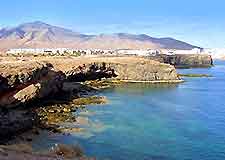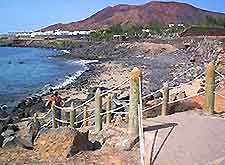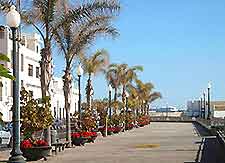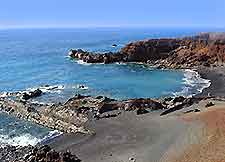Lanzarote Life and Visitor Travel Tips
(Lanzarote, Canary Islands, Spain)

One of the most popular of the Canary Islands, Lanzarote is a major tourist destination and has much to offer visitors, including endless stretches of sandy beaches, beautiful coastlines lined with hotels, and numerous notable architecture structures, which can be found throughout Lanzarote.
Many people choose to visit Lanzarote to enjoy the island's relaxed pace of life and appealing scenery, which includes volcanic 'lunar landscapes' and contrasting lush plantations.
Lanzarote is also known for its vineyards - which enjoy the hot, sunny Canarian weather, and its plentiful marinas - which offer cruises around the island and are one of the best ways to fully appreciate the beauty of Lanzarote from a distance.
Tourism and Tourist Information (Oficinas de Turismo)
A number of helpful tourist information centres can be found on the island of Lanzarote, offering a range of travel tips and advice, together with leaflets and brochures about attractions, maps and transport timetables, hotel booking services and the latest information about festivals and events. A popular tourist information centre can be found at Lanzarote's airport, in the arrivals hall, and is open daily (tel: +34 928 846 073). Other notable tourism bureaus and kiosks in Lanzarote can be found in Arrecife and the Puerto del Carmen - roughly halfway along the Playa Grande.
Arrecife Tourist Information Kiosk
Address: Avenida Generalisimo Franco, Arrecife, Lanzarote, Canary Islands, Spain
Tel: +34 928 811 860
Open hours: Monday to Friday - 09:00 to 13:00 and 16:30 to 19:30, Saturday - 09:00 to 13:00
Puerto del Carmen Tourist Office
Address: Avenida Playas, Puerto del Carmen, Lanzarote, Canary Islands, Spain
Tel: +34 928 515 337
Open hours: Monday to Friday - 09:00 to 13:00 and 16:30 to 19:30, Saturday - 09:00 to 13:00

Language
Spanish is the third most widely spoken language in the world, behind Chinese and English. Although Spanish is the main language in Lanzarote, English, French and German are generally understood at most hotels and tourist attractions, with restaurants in Lanzarote often providing menus in several different languages. In smaller towns and villages around the island, a phrase book may prove useful.
Tipping
Tipping is quite discretionary in Lanzarote, with taxi charges often rounded up slightly, although this is by no means a requirement. Restaurants always include service charges by law and these should be clearly stated on the menus, although a small tip is usually expected and very much appreciated. Hotel staff, such as luggage handlers, happily accept a gratuity, which can simply be one or two Euros. Generally, no other public service workers in Lanzarote expect to receive tips. Tips should always be paid in cash, to ensure that the person it is intended for receives it fully.

Sunburn and Sunbathing
Located close to the Sahara, the Canary Islands are known for their clear skies and fine, sunny weather, and Lanzarote is no exception. Even on cloudy and breezy days, sunburn is likely, so always take the relevant precautions, using high-factor sun lotions during the day, particularly when sunbathing on one of Lanzarote's many beaches.
Places of Worship
The national religion of Lanzarote and throughout Spain is Roman Catholic, although plenty of other notable faiths and major religions are also represented in Lanzarote, including Protestants and Muslims amongst others. There are a good selection of churches that welcome visitors to the island and many of these hold regular parish services, although they may operate a fairly formal dress code.

Smoking
As from January 2006, many buildings, offices and types of public transport in Lanzarote and throughout the Canary Islands now restrict smoking and this is usually clearly indicated by prominent no-smoking signs. Spanish law makes it illegal to smoke in many public places, particularly in work places, where food is being served and where children are specifically catered for, unless designated smoking areas are present. It is always worth exercising discretion when choosing a place in which to smoke in Lanzarote, and a good idea is to only smoke when others around you are already smoking.
Tips for Using the Euro
The Euro is made up of eight coins and seven paper notes and was introduced on January 1, 2002. The 12 original members of the European Union - Austria, Belgium, Finland, France, Germany, Greece, Ireland, Italy, Luxembourg, Netherlands,
Portugal, and Spain - planned the event for many years in advance, deciding upon a specific conversion rate for each country's national currency. The colourful Euro bills, which include holograms and shades of green, yellow, blue, mauve, and orange, are identical throughout Europe. Coins have one common and one national side, but they can be used in any of the member countries, regardless of the country of issue. Old currencies are no longer accepted as legal tender, although major banks will happily convert them into Euros.
Telephones and Emergency Numbers
- Emergencies in Lanzarote - for police dial 091 (national) or 092 (local)
- For fire emergencies in Lanzarote - dial 080 or 085 and for an ambulance dial 409 5530
- To call from one city code to another in Lanzarote- first dial '0' followed by the Spanish city code and the main telephone number
Safety
Being such a major holiday destination, bag snatchers and pickpockets are always present in Lanzarote, so be vigilant and careful with personal belongings. Wear bags and cameras across your body when walking around Lanzarote and consider using discreet money belts. Also, be sure to never leave valuables on show in parked cars and hotel rooms.
Taxes
VAT (IVA) is always included in the price and refunds are unusual in Lanzarote and throughout Spain. Tourists visiting the island from countries outside of the EU may claim tax refunds where the item was purchased for personal use and cost more than a certain amount. Lanzarote shopkeepers can usually provide further information if required.
 One of the most popular of the Canary Islands, Lanzarote is a major tourist destination and has much to offer visitors, including endless stretches of sandy beaches, beautiful coastlines lined with hotels, and numerous notable architecture structures, which can be found throughout Lanzarote.
One of the most popular of the Canary Islands, Lanzarote is a major tourist destination and has much to offer visitors, including endless stretches of sandy beaches, beautiful coastlines lined with hotels, and numerous notable architecture structures, which can be found throughout Lanzarote.

